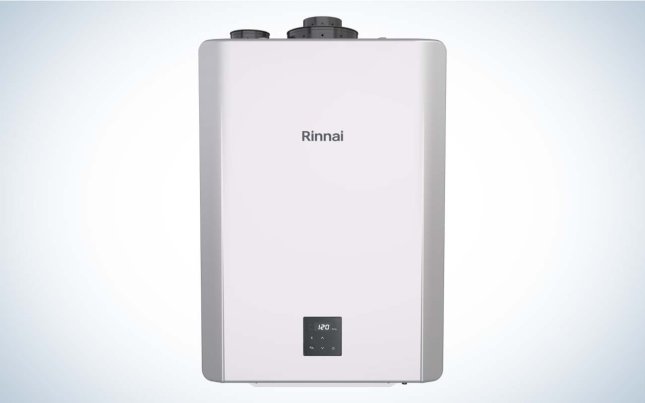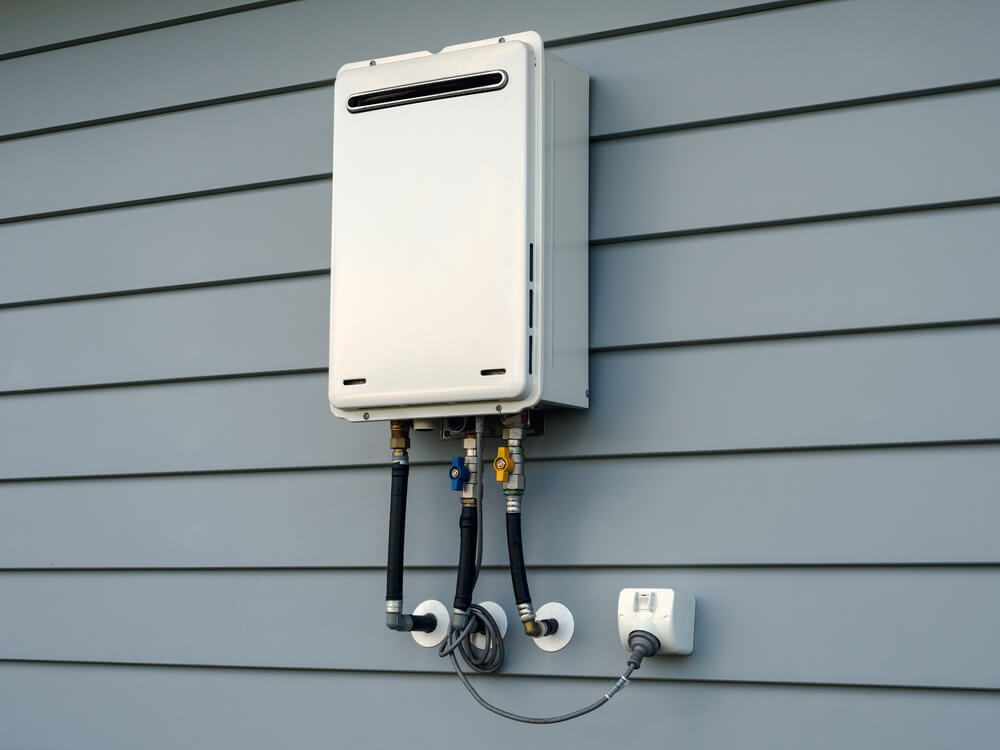Gaining More Value: The Upsides Of On-Demand Water Heaters
Gaining More Value: The Upsides Of On-Demand Water Heaters
Blog Article
Are you trying to find information and facts about Why You Should Consider a Tankless Water Heater?

In a world where benefit and effectiveness preponderate, it's no surprise that homeowners are regularly on the lookout for smarter ways to manage their home's energy usage and convenience. One technology that has steadily acquired appeal is the tankless water heater. But exactly what makes these systems stick out from the traditional tank-based versions the majority of us grew up with? Allow's dive in and discover the benefits of tankless water heaters, aiding you choose if it's time to make the switch in your house.
Intro
Photo this: you enter the shower after a lengthy day, expecting a soothing waterfall of hot water, just to be welcomed by icy droplets since the last person used all of it up. Audio familiar? Traditional hot water heater keep a fixed amount of warm water, implying you go to the mercy of that storage tank's supply. Tankless systems, on the other hand, warmth water as needed. No more going out mid-shower, no more wrestling with schedules just to make certain hot water is readily available.
Comprehending Tankless Hot Water Heater
What Are Tankless Water Heaters?
Tankless water heaters, in some cases referred to as on-demand or instant hot water heater, give hot water just as it's required. Rather than saving gallons of pre-heated water, these devices kick into activity the minute you activate the tap. Water goes through a heat exchanger, heating up in real-time, meaning you get an uninterrupted circulation of hot water without the demand for a big tank sitting lazily by.
How Do They Vary from Typical Systems?
Traditional heaters hold a tank of hot water, utilizing energy to maintain that container at a constant temperature. Tankless units eliminate the standing supply, cutting down on wasted power and the large footprint of a huge cylinder. Essentially, you're updating from a "accumulation" way of thinking to a "made-to-order" technique.
Common Types of Tankless Systems
Tankless water heaters typically can be found in 2 selections: gas and electric. Gas designs tend to provide greater flow rates, suitable for bigger households, while electrical versions commonly serve smaller sized homes and are generally much easier to mount. Additionally, some systems are created for point-of-use (offering one fixture) while others can manage the whole home's warm water needs.
Key Advantages of Tankless Water Heaters
Power Effectiveness and Price Cost Savings
Say goodbye to heating up a titan container's well worth of water and maintaining it cozy all the time. Tankless heating systems reduce standby energy losses, which can reduce energy bills. While the initial expense may be higher, the long-lasting cost savings commonly justify the investment.
3. Space-Saving Design
If your home is short on storage space, getting rid of the cumbersome storage tank frees up useful area. Tankless units are portable and can commonly be installed on wall surfaces, hidden in corners, or installed in tight energy wardrobes without grabbing all of the entire space.
4. Longer Lifespan
A properly maintained tankless water heater can outlast its tank-based relative. Traditional storage tanks could last 10-15 years, while tankless models can maintain chugging along for two decades or more, making them a solid financial investment with time.
1. Limitless Warm Water Supply
Ever before needed to schedule showers so everyone gets their reasonable share of hot water? With tankless, that becomes a thing of the past. As long as the heating unit's circulation ability isn't surpassed, you can take back-to-back showers without becoming a popsicle.
5. Improved Water Quality
Saving water in a storage tank can in some cases result in debris build-up or a slightly "off" taste. With tankless systems, fresh water is warmed instantly, decreasing the opportunities of debris accumulation and possibly providing cleaner-tasting water.
Factors to consider Before Switching
Though the advantages are compelling, it's important to consider a couple of elements before fully devoting.
Reviewing Your Home's Water Usage Patterns
If your family all at once makes use of several components with high warm water demand, make sure the system's flow rate fulfills your needs. Knowing your usage patterns helps you select the best size and type of tankless heating system.
Upkeep and Care Tips
Tankless systems are relatively low upkeep, but they aren't set-it-and-forget-it devices.
Regular Cleansing and Descaling
Hard water minerals can accumulate in the warm exchanger, influencing efficiency. Normal descaling (frequently recommended yearly) maintains the device running at peak performance.
Yearly Specialist Examinations
A yearly checkup from a professional ensures small concerns are captured early. They'll examine the device's efficiency, search for leaks, and help preserve ideal effectiveness.
Preliminary Investment Costs
Tankless heating systems usually feature a higher ahead of time price tag. In between the device itself and potential setup adjustments, the first expense may give you sticker label shock. However keep in mind to view it as a lasting investment.
Installation Demands
Depending on your home's framework, you could need extra electric capacity or gas line upgrades. Guarantee you recognize the installation requirements and seek advice from a professional to prevent shocks.
Ensuring Proper Ventilation
For gas models, proper ventilation is necessary to safely remove exhaust gases. Make certain airing vent systems are clean and correctly installed to prevent any potential safety and security threats.
Contrasting Different Brands and Versions
Not all tankless water heaters are created equivalent.
Looking Into Trustworthy Suppliers
Look for credible brands with a background of producing quality units. A reliable supplier usually supplies better consumer support and longer service warranties.
Setup: Do It Yourself or Expert?
While some home owners delight in taking on projects themselves, tankless setup might not be the most effective time to burst out the toolbox.
Pros and Cons of Do It Yourself Installation
A do it yourself mount can conserve cash, however it includes risks. Inaccurate setup can result in ineffectiveness or safety concerns. If you're handy and have experience, it may be practical-- but wage care.
Checking Out Testimonials and User Responses
User evaluations and comments from next-door neighbors or good friends that have gone tankless can supply important understandings. Sometimes, real-life experiences can be much more telling than advertising brochures.
When to Call a Professional Plumbing Professional
For most, calling a pro makes certain whatever's done appropriately. An expert plumber comprehends local codes, sizing demands, and airing vent parameters, minimizing the danger of incidents.
Making best use of Performance
You've purchased a tankless system-- currently optimize its efficiency.
Optimal Temperature Level Settings
Most individuals set their units between 120-140 F. Adjusting the temperature can improve convenience and financial savings. Experiment to find a wonderful area that doesn't squander power.
Pairing with Low-Flow Fixtures
Want to stretch your system's abilities? Consider installing low-flow showerheads and taps. They reduce water use, permitting your tankless system to deliver a steady stream of warm water without stressing.
Environmental Impact
Tankless hot water heater line up with greener living goals.
Lowered Carbon Impact
By using much less energy and just heating water as required, tankless systems can lower your home's carbon footprint, reducing your ecological effect.
Preserving Natural Resources
Less power consumption and less lost warm water translate into less natural deposits being used, an ecological win-win.
That Profits Most from Tankless Heating systems?
The appeal of tankless heaters is that they can match a range of homes.
Large Households vs. Single Residents
Huge households might like the endless hot water supply, while single residents appreciate the energy financial savings from not warming a whole tank for just someone's early morning shower.
Home Owners with Restricted Area
If your home is short on square footage, losing the bulky container maximizes room for various other fundamentals-- or maybe just a lot more elbow room.
Eco-Conscious Customers
Going tankless aligns with environmentally friendly worths, ensuring you're not throwing away power or resources.
Future Trends in Tankless Hot Water Heater
The globe of home appliances is ever-evolving, and tankless hot water heater are no exception.
Innovations in Technology
R&D is regularly enhancing warm exchangers, making systems much more effective and resilient. Future models could be also quieter, a lot more small, and better suited for varying climates.
Smart Home Integration
Picture adjusting your water heater's temperature level by means of an app or getting maintenance notifies on your phone. As clever home technology advancements, we'll see more connectivity and benefit.
Conclusion
Choosing a tankless hot water heater is greater than just upgrading your home's warm water system; it's purchasing long-term convenience, energy efficiency, and a greener way of living. By considering your family's water use, being mindful of installation demands, and dedicating to regular maintenance, you can enjoy a constant stream of hot water without the luggage of a large container. As innovation evolves, you can eagerly anticipate also smarter, extra efficient tankless options that not just make your life less complicated yet additionally profit the world.
Pros and Cons of Tankless Water Heaters
Tankless Water Heater Pros
Saves Energy: Simply put, you re spending less energy to create hot water, so your total carbon footprint goes down, not to mention your bills. Lasts Longer Than Storage Tanks: Storage tank units need to be replaced every 15 years or so. But tankless units? They can last for 30 years before they give out on you. Constant Hot Water: Need to take a shower and don t want the water running cold? Awesome it won t. The water will stay hot the entire time because it creates hot water on demand. Saves You Money: Less water usage equals less money. Beyond that, you re not paying to keep water hot 24/7. Those savings add up quickly. Better for the Environment: Less water waste is better for everyone. It saves you money, but it s also environmentally conscious at the same time. Tankless Water Heater Cons
It Can Take a Minute: Depending on your specific unit and its placement, it can take anywhere from 10 seconds to 2 minutes to fully heat up. Because there s no storage tank, it heats water as you need it. Upfront Purchase Price: While we talked about their longevity, there s sticker shock when you look at brand-new tankless units to install. It pays for itself, but it s still a big chunk of change at first. Has its Limits: If you run multiple appliances at once, such as the dishwasher, washing machine, and maybe you take a shower at the same time, there might not be enough hot water. https://www.airsouthnow.com/blog/water-heater-service/pros-and-cons-of-tankless-water-heaters/

Do you really like reading about Unveiling the Hot Trend: The Benefits of Tankless Water? Put a review below. We will be pleased to see your opinion about this article. We are looking forward that you visit us again before long. Appreciated our piece? Please quickly share it. Help others find it. Many thanks for your time. Come back soon.
About This Report this page